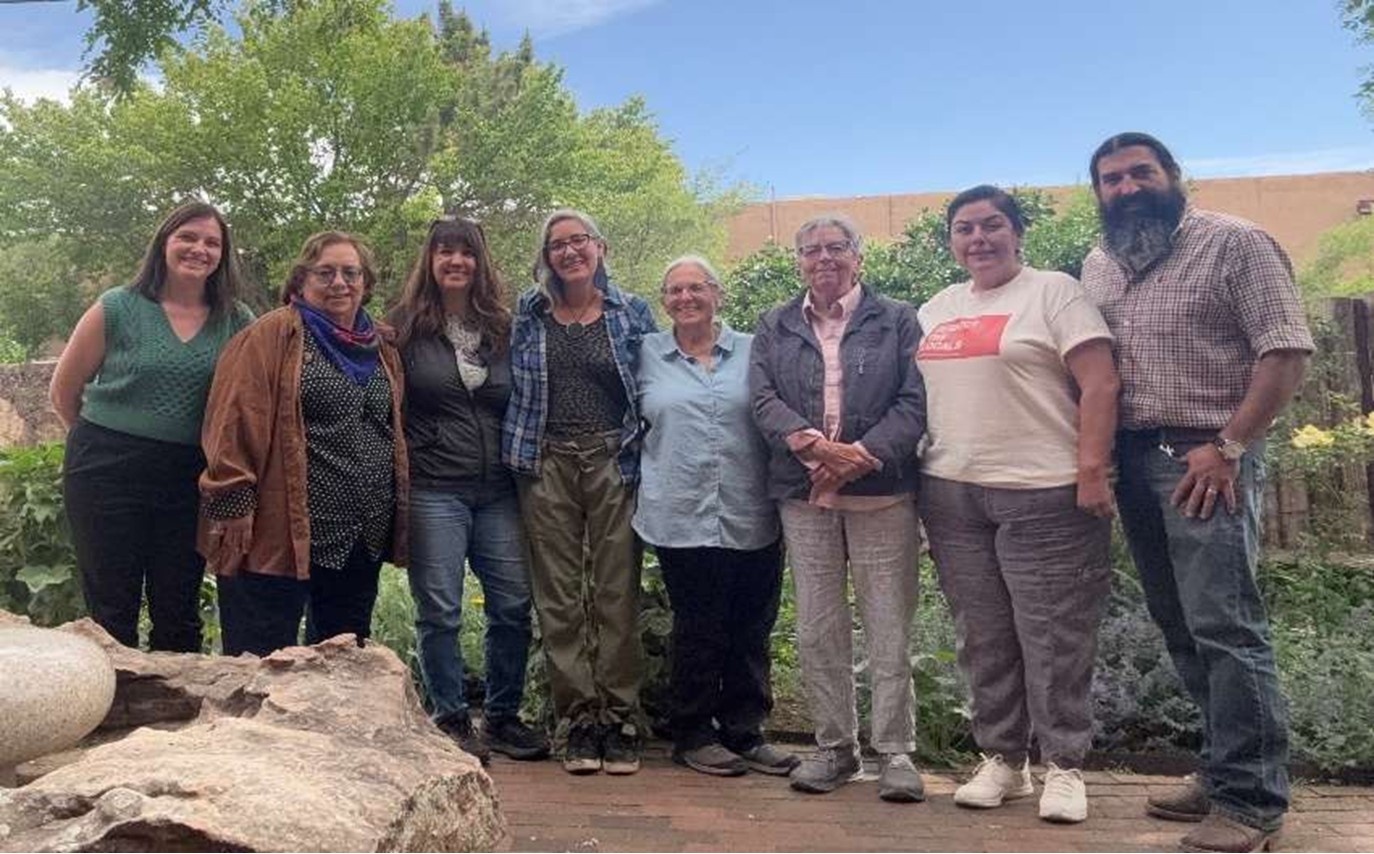
Patrick Jaramillo of AFSC (far right) joins other members of Una Vida Buena, Sana y Alegre Consejo or Good, Healthy, Joyful Life.
For over 50 years, AFSC New Mexico has worked for self-determined communities that have the capacity to feed and care for our children, elders, and neighbors – including human, animal, and plant.
Patrick Jaramillo, who co-directs AFSC’s work, says that goal is challenging given the large military presence in the state and the economic and political power of the oil and gas industry. The state’s reliance on fossil fuels threatens land and water – and means a few corporations get even wealthier as people are made poorer.
Through organizing with community partners, AFSC is helping to turn the tide. After over 10 years of work, the Contra Santolina Coalition recently declared victory after stalling a proposed 90,000 home development that would have robbed communities of life-giving water. The New Mexico Environmental Law Center offered important help.
Patrick says the message was simple yet profound: Water is life. “Although our concerns about water availability were dismissed early on, we kept at it,” Patrick says. “We sat through hours of public meetings and offered comments when we could.” While officials contended there was plenty of water, a Rio Grande that ran dry twice proved otherwise.
Expanding the struggle for water availability
The struggle to stop Contra Santolina has led AFSC New Mexico into more coalition work. “We recognize there are other developments and threats to the Middle Rio Grande region at large,” Patrick says. “That’s why we need to expand our scope and start to raise the consciousness and awareness of more people.”

Members of the Atrisco Research and Collaborative
With the Atrisco Research and Collaborative, organizers are talking about how economic and political decisions need to be made with a water consciousness.
Atrisco is a neighborhood and a region in the Albuquerque South Valley. AFSC’s work with partners involves reinvigorating and re-engaging communities to understand what’s at risk. It’s not just surface water that’s disappearing. As pumping continues, the groundwater table keeps dropping. People with wells are being affected.
At the moment, too many policies are based on jobs and dollars without regard for water availability and sustainability. Too often, decisionmakers dismiss the importance of acequias, vital irrigation canals under local, democratic control. Unfortunately, development is seen as a better use of land than farming.
The landscape is changing, as well. The bosques (i.e. the forests along rivers) are defining features of Albuquerque – and they’re all at risk of drying up. “The threat with further development and climate change is a lot bigger and more imminent,” Patrick says. “These changes in land and water are happening a lot faster than people were originally warned about.”
Vida Buena Sana y Alegre
Another group AFSC is helping to organize is Vida Buena Sana y Alegre (VBSA), or a Good, Healthy, Joyful Life. VBSA is drawing on traditional practices of water and land management that support vibrant communities mutually dependent on each other.
In this initiative, the community is looking not just at farming, but at the broader conditions needed for lives that are truly good, healthy and joyful. Communities come together and ask to discuss their priorities – and how to achieve them.
“We’re able to say for ourselves what we need,” Patrick says. “In addition to healthy food and access to land and water, we also need childcare, elder care, mutual aid – all these other things.”
At both its Annual Farmer Gathering and the VBSA, AFSC New Mexico is using the Quaker tool of queries to help people consider what they’re facing and what actions they can take together. Patrick says that instead of someone coming in and saying, “I have the answers, I know why things are so messed up,” people learn that questions can help them figure it out together. AFSC’s queries include:
- How would you describe our current moment?
- How do you see its traits impacting our communities?
- In this moment, are you feeling called to do anything different?
- What can this community of partners do to support you in action?
Bringing a spiritual dimension to organizing
Given how divided people are these days, none of this organizing is easy. That’s why Patrick says the work must be rooted in spirit. “It’s super easy right now to look at the other side and be really angry with them,” Patrick says. “But if we don’t build those bridges, this division will only deepen. We really need to engage people as human beings.”
With all the challenges of climate change, drought, floods and fires, more conflict is coming at both the local and national levels. He says that’s why we need to show up for each other as human beings, as friends and neighbors.
Patrick refers to Pope Leo, who recently warned against wealth inequality and an economy that kills. Instead, we need to draw on the power of love to come together to create communities where the water and land are protected -- and all people can thrive.